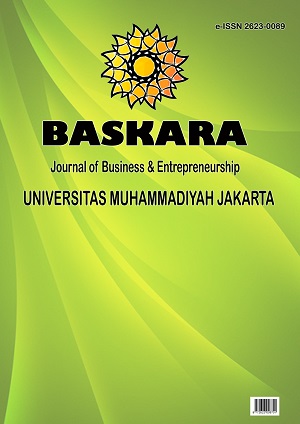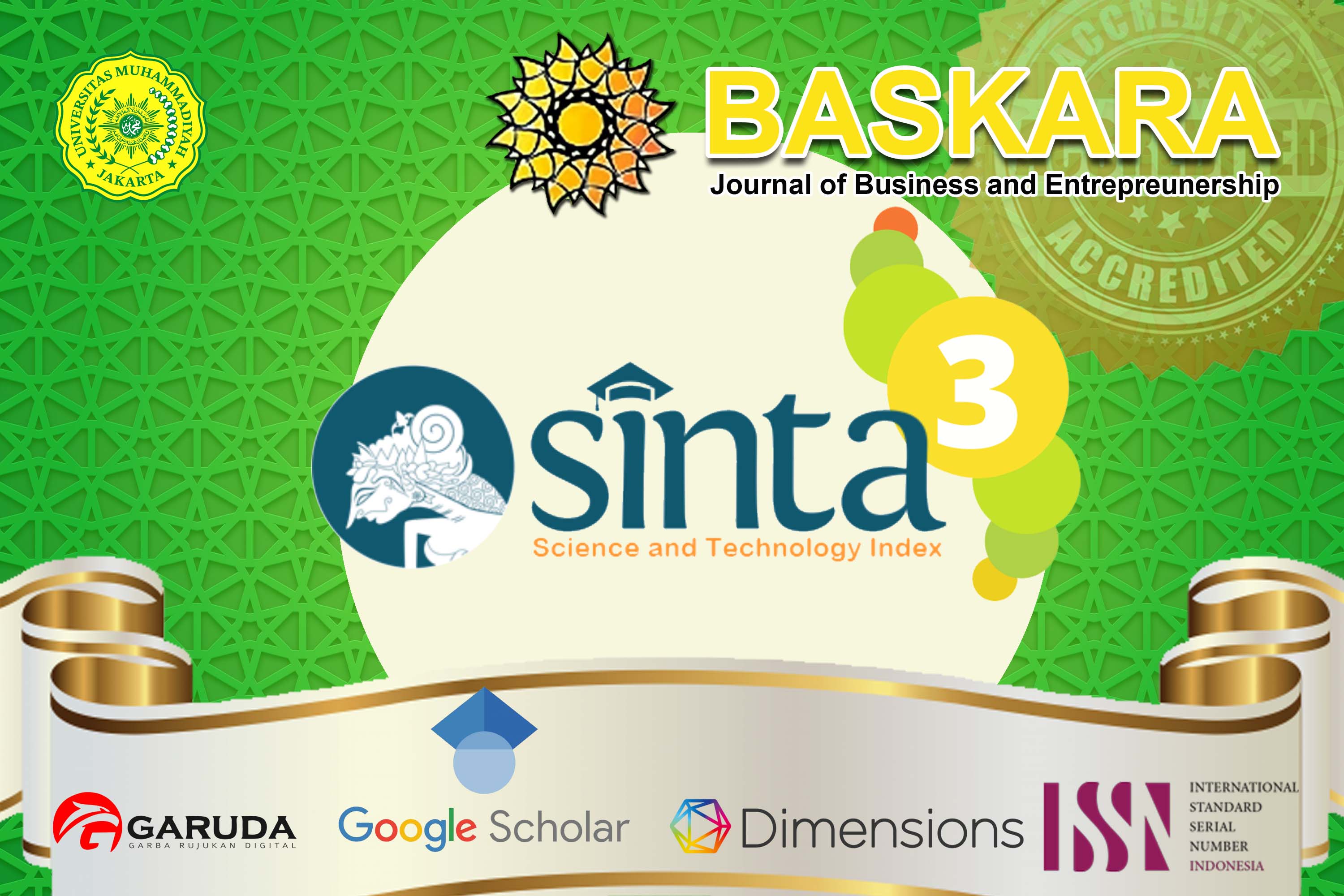Obstacles and Solutions of MSMEs in Electronic Commerce during Covid-19 Pandemic: Evidence from Indonesia
DOI:
https://doi.org/10.54268/baskara.v4i1.10318Keywords:
Covid-19, E-commerce, MSMEs, Perceived Benefit, Business Age, HRAbstract
The Covid-19 pandemic has forced business actors and/or MSMEs to adapt to the wave of disruption. There was a change in the way people shopped, a channel shift. People are abandoning traditional shopping in favor of shopping in the market online. However, there are barriers to MSMEs going digital, such as perceptions of benefits, business age, and HR competencies. This study aims to assist MSMEs in overcoming barriers to e-commerce use during the Covid-19 Pandemic. Because, Micro, Small, and Medium Enterprises are the most vulnerable businesses in a pandemic situation. This is a qualitative type of study. Data collection techniques include listening for and recording important information in order to conduct data analysis through data reduction, data display, and conclusion drawing. This study concludes that in the crisis era, MSMEs that have been in operation for a long time must determine a change in mindset and level of maturity in determining the stance or belief of each step of adopting new technology. Several education, training, exhibition, and mentoring programs must be implemented in order to meet the needs of qualified human resources in e-commerce.References
Arisadi, Y. C., & Djazuli, A. (2013). Pengaruh Ukuran Perusahaan, Umur Perusahaan, Current Ratio, Debt to Equity Ratio dan Fixed Asset to Total Asset Ratio terhadap Kinerja Keuangan pada Perusahaan Manufaktur di Bursa Efek Indonesia. Jurnal Aplikasi Manajemen, 66, 567–574. https://jurnaljam.ub.ac.id/index.php/jam/article/view/593
Ashari, R. A. (2018). Analisis Faktor-Faktor Penggunaan E-Commerce bagi Usaha Mikro Kecil Menengah pada Pengusaha Perak di Kotagede Yogyakarta. Skripsi. Yogyakarta: Fakultas Ekonomi
Chaffey, D. (2002). Chaffey, Digital Business and E-Commerce Management, 6th Edition. Pearson.
Firmansyah, M. A. (2019). Buku Pemasaran Produk dan Merek. In Buku Pemasaran Produk dan Merek (Issue August).
Harto, B., & Komalasari, R. (2020). Optimalisasi Platform Online Internet Marketing Untuk SME Little Rose Bandung. Empowerment in the Community, 1(1), 1–6. https://doi.org/10.31543/ecj.v1i1.357
Iacovou, C. L., Benbasat, I., & Dexter, A. S. (1995). Electronic Data Interchange and Small Organizations: Adoption and Impact of Technology. MIS Quarterly: Management Information Systems, 19(4), 465–485. https://doi.org/10.2307/249629
Komalasari, R. (2020). Manfaat Teknologi Informasi dan Komunikasi di Masa Pandemi Covid 19. Tematik, 7(1), 38–50. https://doi.org/10.38204/tematik.v7i1.369
Kuan, K. K. Y., & Chau, P. Y. K. (2001). A Perception-Based Model for EDI Adoption in Small Businesses Using a Technology-Organization-Environment Framework. Information and Management, 38(8), 507–521. https://doi.org/10.1016/S0378-7206(01)00073-8
Kusumastuti, A. D. (2020). Pengaruh Pandemi Covid-19 terhadap Eksistensi Bisnis UMKM dalam Mempertahankan Business Continuity Management (BCM). EJournal Administrasi Bisnis, 8(3), 224–232.
Lim, S. C., Lim, S. P., & Trakulmaykee, N. (2018). An Empirical Study on Factors Affecting E-Commerce Adoption among SMEs in West Malaysia. Management Science Letters, 8(5), 381–392. https://doi.org/10.5267/j.msl.2018.4.008
Mehrtens, J., Cragg, P. B., & Mills, A. M. (2001). A Model of Internet Adoption by SMEs. Information and Management, 39(3), 165–176. https://doi.org/10.1016/S0378-7206(01)00086-6
Nainggolan, R. (2016). Gender, Tingkat Pendidikan dan Lama Usaha Sebagai Determinan Penghasilan UMKM Kota Surabaya. Kinerja, 20(1), 1. https://doi.org/10.24002/KINERJA.V20I1.693
Rahayu, R., & Day, J. (2015). Determinant Factors of E-commerce Adoption by SMEs in Developing Country: Evidence from Indonesia. Procedia - Social and Behavioral Sciences, 195(March), 142–150. https://doi.org/10.1016/j.sbspro.2015.06.423
Rhenald, K. (2018). The Great Shifting - Google Buku. PT Gramedia Pustaka Utama.
Sudarwati, Y. (2017). Pengembangan Sumber Daya Manusia (SDM) Industri E-Commerce Indonesia. IX(17), 13–16.
Sukmaningrum, T. (2012). Analisis Faktor-Faktor yang Mempengaruhi Kualitas Informasi Laporan Keuangan Pemerintah Daerah (Studi Empiris pada Pemerintah Kabupaten dan Kota Semarang). Skripsi. Semarang: Fakultas Ekonomi dan Bisnis.
Sulistyowati, R. I. (2017). Pengaruh Kualitas SDM dan Pemanfaatan Teknologi Informasi Terhadap Kualitas Laporan Keuangan Pemerintah Kota Semarang Dengan Sistem Pengendalian Intern Sebagai Variabel Intervening. In Jurnal Akuntansi.
Sumarni, T., & Melinda, L. D. (2020). Media Sosial dan E-commerce sebagai Solusi Tantangan Pemasaran Pada Masa Pandemi Covid-19 ( Studi Kasus : UMKM Warung Salapan ). 6(2), 163–171.
World Health Organization. (2020). Infection Prevention and Control During Health Care When COVID-19 is Suspected. Who Health Organization, March, 1–5.
Downloads
Published
Issue
Section
License
In order for Baskara: Journal of Business and Entrepreneurship to publish and disseminate research articles, we need publishing rights (transfered from author(s) to publisher). This is determined by a publishing agreement between the Author(s) and Baskara Journal. This agreement deals with the transfer or license of the copyright of publishing to Baskara: Journal of Business and Entrepreneurship, while Authors still retain significant rights to use and share their own published articles. Baskara : Journal of Business and Entrepreneurship supports the need for authors to share, disseminate and maximize the impact of their research and these rights, in any databases.
As a journal Author, you have rights for a large range of uses of your article, including use by your employing institute or company. These Author rights can be exercised without the need to obtain specific permission. Authors publishing in Baskara : Journal of Business and Entrepreneurship have wide rights to use their works for teaching and scholarly purposes without needing to seek permission, including:
- use for classroom teaching by Author or Author's institution and presentation at a meeting or conference and distributing copies to attendees;
- use for internal training by author's company;
- distribution to colleagues for their reseearch use;
- use in a subsequent compilation of the author's works;
- inclusion in a thesis or dissertation;
- reuse of portions or extracts from the article in other works (with full acknowledgement of final article);
- preparation of derivative works (other than commercial purposes) (with full acknowledgement of final article);
- voluntary posting on open web sites operated by author or author’s institution for scholarly purposes.
Copyright Transfer Agreement for Publishing (Publishing Right)
The Authors who submit manuscript has to understand that if accepted for publication, mean that all copyright and publishing right of the article shall be assigned/transferred to Baskara: Journal of Business and Entrepreneurship as assigned publisher.
- CC BY-NC: This license allows reusers to distribute, remix, adapt, and build upon the material in any medium or format for noncommercial purposes only, and only so long as attribution is given to the creator.
It includes the following elements:
BY ![]() – Credit must be given to the creator
– Credit must be given to the creator
NC ![]() – Only noncommercial uses of the work are permitted
– Only noncommercial uses of the work are permitted
Baskara (C) Copyright (2022):
BASKARA: Journal of Business and Entrepreneurship by https://jurnal.umj.ac.id/index.php/baskara
is licensed under a Creative Commons Attribution-NonCommercial 4.0 International License








